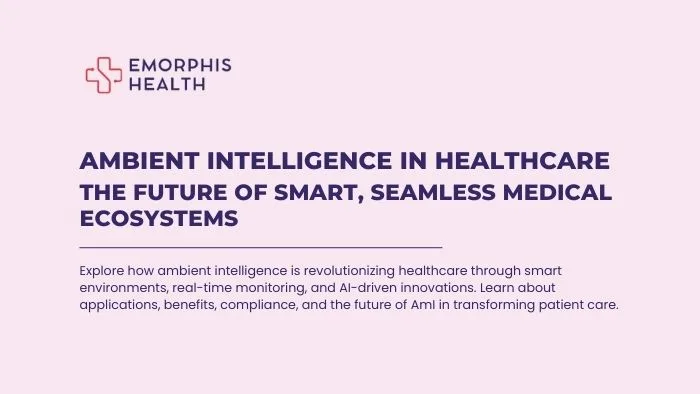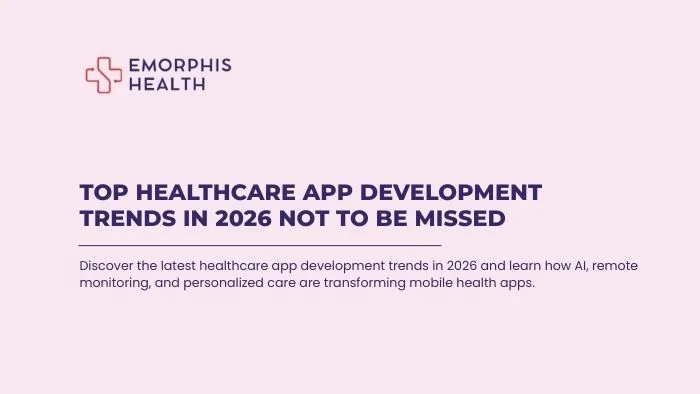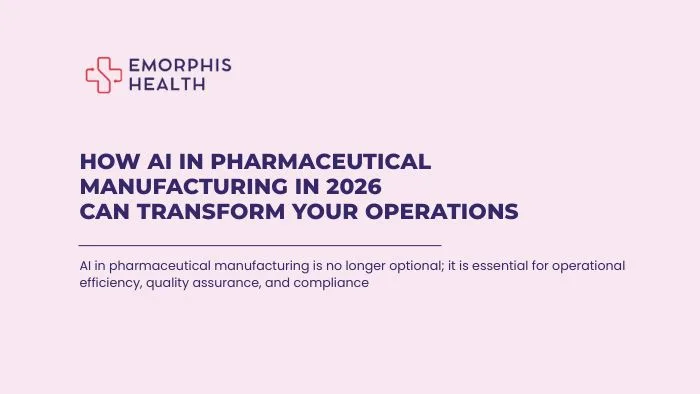In today’s rapidly evolving medical landscape, ambient intelligence in healthcare is emerging as a game-changing paradigm that blends artificial intelligence, IoT, and context-aware systems to deliver more competent and personalized care. As hospitals and healthcare providers seek innovative ways to improve patient outcomes and operational efficiency, ambient intelligence also referred to as Ambient AI is reshaping how we think about health technology.
What is Ambient Intelligence in Healthcare?
See Contents
- 1 What is Ambient Intelligence in Healthcare?
- 2 How Does Ambient Intelligence Work?
- 3 Ambient Intelligence vs Traditional AI
- 4 Top 15 Developments and Products Using Ambient Intelligence in Healthcare
- 5 Ambient Intelligence Use in Healthcare Applications
- 6 Top 8 Benefits of Ambient Intelligence in Healthcare
- 7 Shaping Tomorrow’s Care, The Future of Ambient Intelligence in Healthcare
- 8 Compliance and Regulations
- 9 Cost and Development Timeline
- 10 Why Choose Emorphis Health for Ambient Intelligence in Healthcare?
- 11 Conclusion
Ambient intelligence in healthcare refers to intelligent environments equipped with embedded systems that respond to the presence of people and their contextual needs. These environments use sensors, devices, and AI algorithms to gather and process data from the surroundings, enabling proactive and seamless care delivery.
Unlike conventional systems, ambient intelligence systems work quietly in the background, enhancing the user experience without direct interaction. Imagine a hospital room that automatically adjusts lighting based on a patient’s sleep pattern or a system that alerts nurses when a patient is at risk of falling. That’s Ambient AI in action.
According to the Fortune Business Insights report, the global ambient intelligence market was valued at USD 23.59 billion in 2023, reaching USD 29.21 billion in 2024 and surging to USD 172.32 billion by 2032. This growth reflects a strong compound annual growth rate (CAGR) of 24.8% over the forecast period.
According to the Global Market Estimates report, the global ambient intelligence market is expected to grow at a CAGR of 18.3% by 2029, driven by the integration of AI, IoT, and advanced sensors that enable intelligent, responsive environments across homes, cities, and industries. While the technology offers enhanced efficiency, personalization, and energy savings, it remains. Nevertheless, its transformative potential continues to fuel innovation and market expansion.
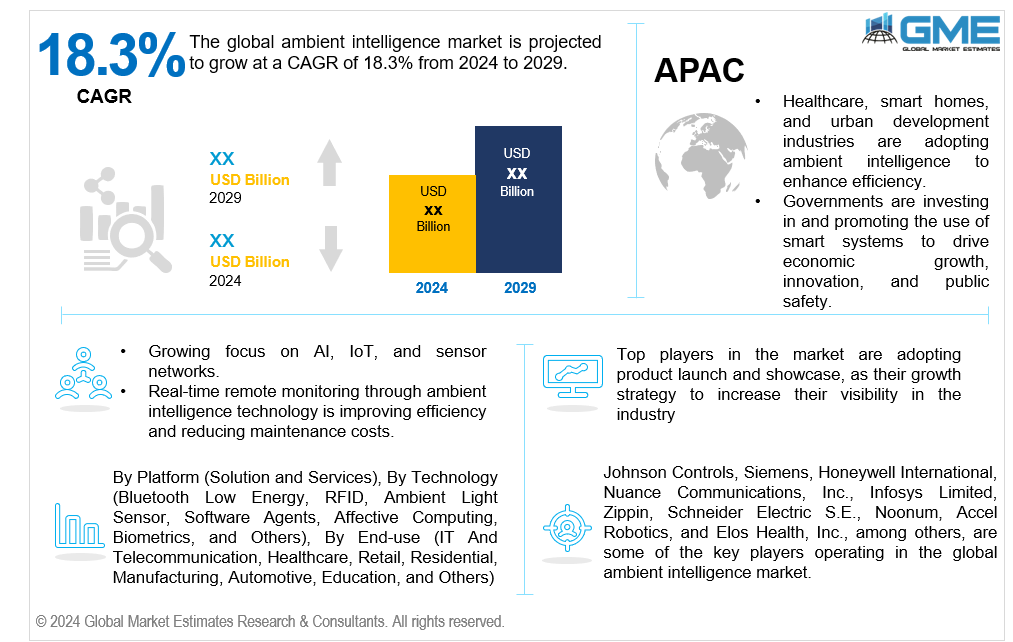
According to the Grand View Research report, the global ambient intelligence market was valued at USD 18.44 billion in 2022 and is projected to grow at a 24.4% CAGR through 2030. Smart city projects and the rising demand for smart homes fuel growth.
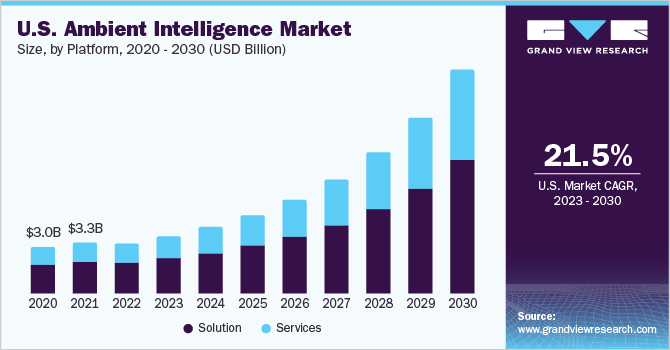
Ambient Intelligence helps create adaptive, efficient environments that improve energy use, waste management, and urban infrastructure, supporting sustainability in rapidly growing urban areas.

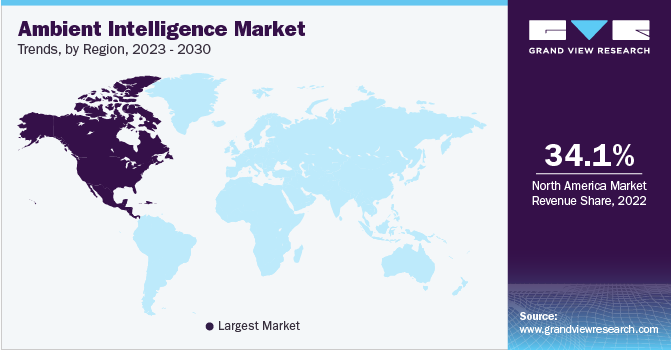
How Does Ambient Intelligence Work?
Ambient intelligence works through a combination of sensors, data analytics, machine learning, and responsive technologies. Here’s a breakdown:
- Sensing: Sensors monitor vital signs, movements, room conditions, and even patient emotions.
- Processing: AI algorithms process the collected data in real time.
- Contextual Awareness: The system interprets the data to understand the patient’s context and needs.
- Response: Actions are triggered, such as sending alerts, adjusting devices, or notifying caregivers.
This real-time interaction between the environment and human behavior makes ambient intelligence in healthcare revolutionary.
Ambient Intelligence vs Traditional AI
While both rely on data and algorithms, Ambient AI and traditional AI differ in their design and interaction modes:
- AI typically requires direct interaction users must input data or ask queries.
- Ambient intelligence, on the other hand, is context-aware, proactive, and invisible. It works in the background, often without the user’s active engagement.
For example, a chatbot that answers health questions is AI, but a system that silently monitors and responds to a patient’s needs without intervention is ambient intelligence.
Let’s now check the use of ambient intelligence in healthcare.
Top 15 Developments and Products Using Ambient Intelligence in Healthcare
The rise of ambient intelligence in healthcare has led to the creation of intelligent systems that enhance patient care, improve clinical workflows, and increase operational efficiency. As Ambient AI evolves, healthcare environments are becoming more intuitive and context-aware. Below is a comprehensive list of key products and solutions powered by ambient intelligence systems in healthcare:
1. Smart Hospital Rooms
Smart hospital rooms integrate environmental and biometric sensors to create adaptive spaces focused on patient comfort and clinical needs. These systems adjust lighting, sound, and temperature automatically. For instance, Philips Ambient Experience improves patient well-being in diagnostic and recovery rooms by offering calming light and audio environments, reducing anxiety during procedures.
2. Fall Detection Systems
Essential for elderly and post-operative care, fall detection systems use motion sensors and machine learning to identify unusual movements. Vayyar Care employs radar-based, non-wearable sensors for privacy-conscious monitoring, while CarePredict analyzes daily activity to predict and prevent falls.
3. Voice-Activated Assistants for Clinicians
Voice-enabled tools like Nuance’s Dragon Ambient eXperience (DAX), built with Microsoft, capture and process doctor-patient conversations to automatically update electronic health records (EHRs). These systems reduce administrative workload and enhance patient interactions.
4. Virtual Nursing Assistants
AI-powered virtual assistants like Florence and Orbita provide patients with medication reminders, appointment scheduling, and emotional support through mobile apps or voice-based systems, improving engagement and adherence to care plans.
5. Remote Patient Monitoring Devices
Wearables like the BioIntelliSense BioSticker and Apple Watch continuously track vital signs—heart rate, oxygen levels, respiration—and transmit data to care teams, enabling early intervention for chronic or high-risk patients without hospital visits.
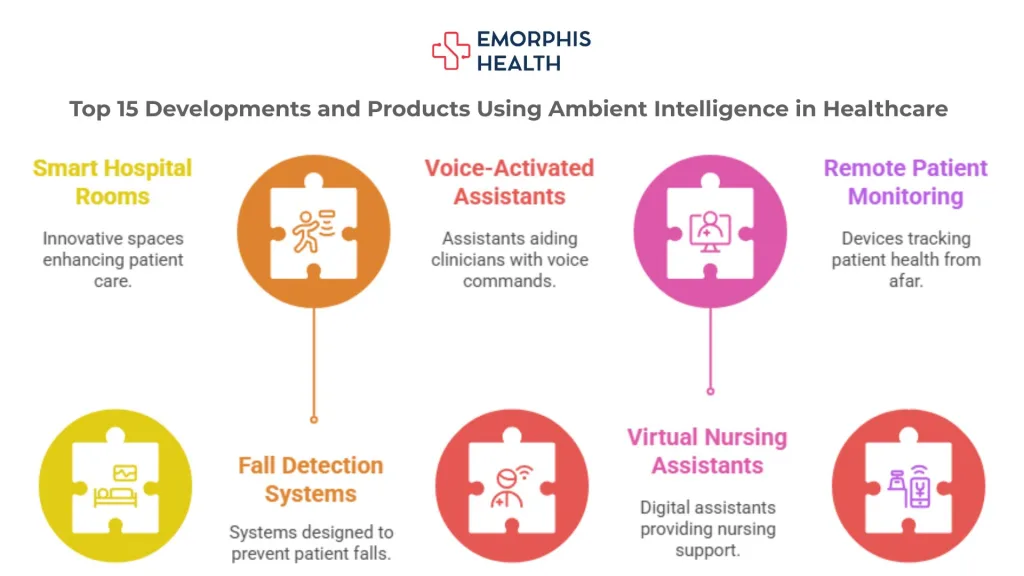
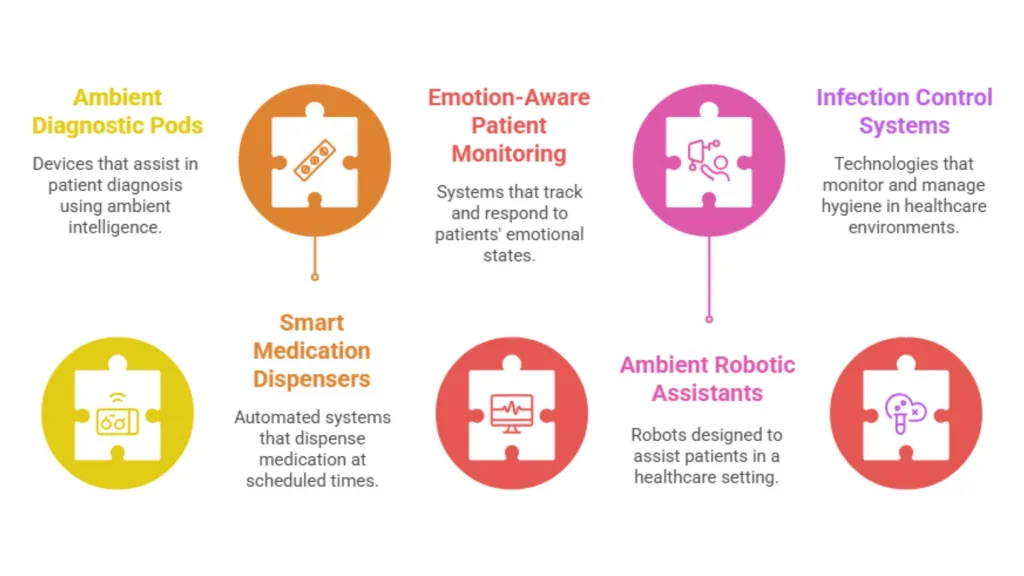
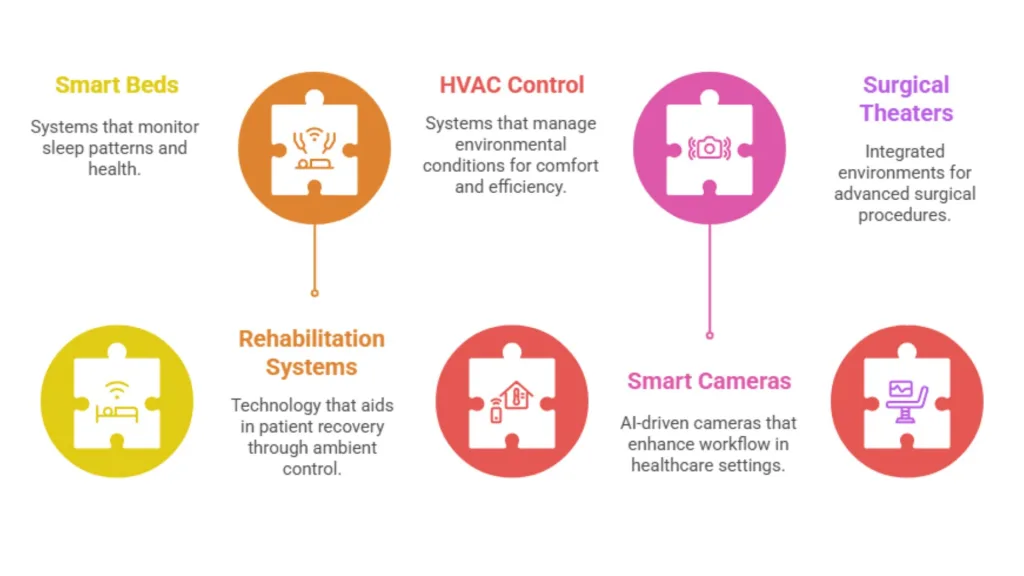
6. Ambient Diagnostic Pods
AI-driven kiosks placed in pharmacies or clinics conduct self-guided health checks such as blood pressure, glucose, and BMI tests. These pods sync with ambient intelligence systems to update records and alert care providers in real time.
7. Smart Medication Dispensers
Devices like Hero and MedMinder dispense medications at the correct time, send reminders, and notify caregivers of missed doses. They reduce medication errors and support chronic disease management.
8. Emotion-Aware Patient Monitoring
Technologies like Affectiva and Cognito analyze facial expressions, voice tone, and physiological signs to assess emotional well-being. Especially useful in mental health, pediatrics, and elderly care, they help clinicians provide timely and empathetic responses.
9. Ambient Robotic Assistants
Robots such as Moxi by Diligent Robotics automate hospital logistics delivering medications, lab samples, or supplies allowing human staff to focus on patient care. These systems navigate dynamically and adapt to hospital workflows.
10. Infection Control and Hygiene Monitoring Systems
Platforms like SwipeSense track staff hygiene practices using sensors and RFID. They monitor compliance in real time, helping reduce hospital-acquired infections and maintain safe environments.
11. Smart Beds and Sleep Monitoring Systems
Smart beds monitor movement, pressure points, and vitals, adjusting automatically to prevent pressure ulcers and detect signs of distress. They alert staff to emergencies, enhancing safety in critical care settings.

12. Ambient-Controlled Rehabilitation Systems
Solutions like MindMaze and Reflexion Health personalize therapy sessions using AI and motion tracking. These systems guide patients through recovery exercises and adjust difficulty based on performance, reducing therapist load.
13. Smart HVAC and Environmental Control Systems
Critical areas like ICUs and operating rooms benefit from smart HVAC systems like Siemens Desigo CC, which maintain air quality, temperature, and pressure using real-time sensor feedback, minimizing infection risks.
14. AI-Powered Smart Cameras for Workflow Optimization
Systems like Care.ai and Artisight use computer vision to monitor hospital operations—tracking staff movement, patient flow, and equipment usage. They help optimize workflows and maintain compliance and safety.
15. Ambient Integrated Surgical Theaters
These smart operating rooms integrate sensors, robotic tools, and ambient controls to create responsive environments. They adjust settings during procedures, deliver context-aware data like real-time vitals, and reduce surgeon cognitive load.
As ambient intelligence continues to evolve, its integration into healthcare systems is not just transforming clinical environments but redefining how care is delivered, monitored, and experienced. The seamless interaction between smart devices, AI, and contextual data is making healthcare more personalized, predictive, and proactive.
These developments are paving the way for a new era of innovation, where the focus shifts from reactive treatment to continuous, intelligent care. Building on this foundation, a wide range of forward-looking healthcare applications can now be developed, leveraging ambient intelligence to address real time patient needs, enhance decision-making for clinicians, and create safer, more adaptive care environments across hospitals, homes, and communities.

Ambient Intelligence Use in Healthcare Applications
Ambient intelligence in healthcare has a wide array of applications:
a. Elderly Care
Ambient intelligence plays a transformative role in elderly care by enabling continuous, nonintrusive monitoring of seniors in both residential and assisted living environments. Smart sensors installed throughout the living space can detect unusual patterns in movement, prolonged inactivity, or potential falls, and immediately send automated alerts to caregivers or medical personnel. These systems also monitor daily routines and behavioral changes over time, helping caregivers intervene before minor issues escalate into emergencies. Technologies like motion-sensitive lighting, voice assistants for reminders, and smart wearables enhance safety and independence for the elderly while reducing the burden on healthcare staff and family members.
b. Chronic Disease Management
For individuals managing chronic conditions such as diabetes, hypertension, or cardiovascular diseases, ambient intelligence systems offer real time, personalized support. These solutions integrate with wearable devices and implantable sensors to continuously track health metrics like glucose levels, heart rate, blood pressure, and even stress indicators. AI-driven platforms analyze the collected data to detect anomalies, trigger timely alerts, and suggest behavioral or dietary adjustments. Smart medication dispensers remind patients of their medication schedule and report adherence to healthcare providers. This proactive monitoring minimizes the risk of complications, reduces hospital visits, and enhances the quality of life for patients managing long-term illnesses.
c. Post Operative Monitoring
Recovery after surgery is a critical phase that ambient intelligence can help manage more efficiently. Smart hospital beds and environmental controls automatically adjust to optimize comfort and healing regulating temperature, light, and bed position based on the patient’s condition. Embedded biosensors and wearables track vital signs such as oxygen levels, pulse, and respiratory rate to detect early signs of infection or complications. These systems can also alert clinicians if abnormal recovery patterns are identified, ensuring faster response times and reducing the risk of readmission. At-home recovery kits with ambient features extend this monitoring beyond the hospital, enabling a smooth and safe transition for patients.
d. Mental Health Support
Ambient intelligence in healthcare is opening up new possibilities for mental health care through emotion-aware technologies. By analyzing speech tone, facial expressions, body language, and behavioral patterns, these systems can detect early signs of depression, anxiety, or cognitive decline. This is especially beneficial in therapy settings, elder care, and remote consultations. Smart assistants can engage patients in meaningful conversations, assess mood, and alert clinicians to significant emotional changes. Such systems help therapists make more informed decisions and allow for early interventions, promoting better mental well-being and more personalized treatment plans.
e. Emergency Response
Ambient intelligence systems offer advanced capabilities for automatic emergency response by continuously assessing a person’s physiological and behavioral data. In the event of sudden changes such as abnormal heart rate, a drop in blood oxygen, or a detected fall these systems can instantly alert emergency services, caregivers, or family members. Geolocation integration ensures that responders are directed to the exact location without delay. Additionally, these systems can communicate critical health data to paramedics before they arrive, speeding up diagnosis and treatment. Whether in smart homes, senior living facilities, or public health hubs, this rapid response feature dramatically increases the chances of survival and recovery during medical emergencies.
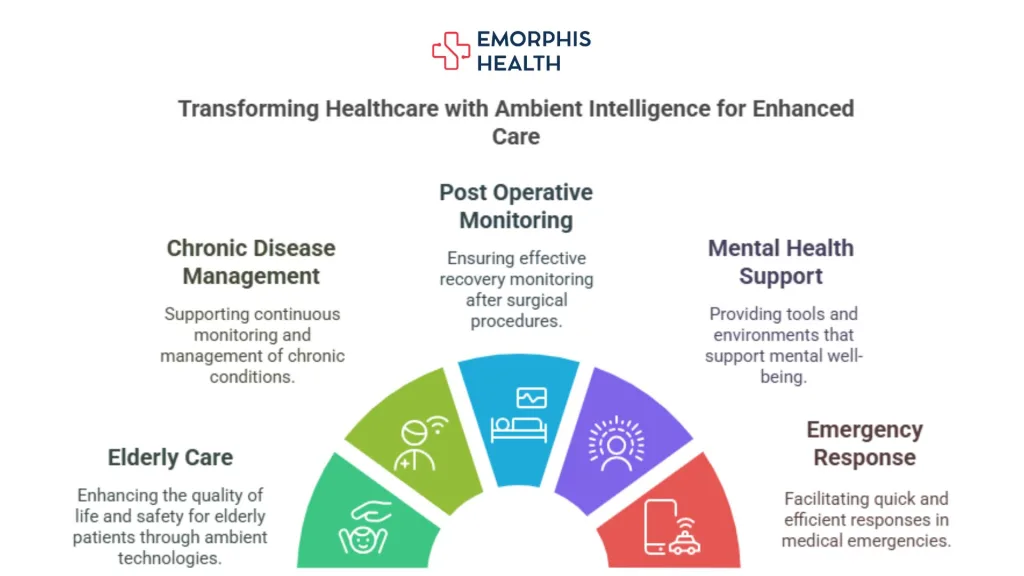
The growing integration of ambient intelligence in healthcare applications such as elderly care, chronic disease management, post-operative recovery, mental health support, and emergency response is reshaping the way care is delivered across diverse settings. These intelligent systems not only enhance clinical efficiency but also bring healthcare closer to the patient offering continuous, context-aware support that adapts to individual needs in real time. As these innovations continue to evolve, they unlock a wide array of advantages for both patients and providers.
From improving health outcomes and reducing hospital readmissions to optimizing resources and ensuring greater patient safety, the benefits of ambient intelligence in healthcare are both immediate and far-reaching.
Top 8 Benefits of Ambient Intelligence in Healthcare
Here are some of the key benefits of adopting ambient intelligence in healthcare:
1. Improved Patient Outcomes
Ambient intelligence in healthcare enables early detection of complications by analyzing real-time data from sensors and devices. This allows timely interventions, reduces emergencies, and improves survival and recovery rates—especially for patients with chronic or high-risk conditions.
2. Enhanced Staff Efficiency
By automating routine tasks like vital sign monitoring and documentation, ambient intelligence frees up healthcare staff to focus on patient care. Voice-activated tools and smart alerts streamline workflows and reduce burnout.
3. Patient-Centered Care
Ambient intelligence personalizes care by adapting to patient behaviors and preferences. From adjusting room conditions to delivering tailored reminders, it enhances comfort, autonomy, and satisfaction in hospital and home care.
4. Cost Savings
Early detection and automation reduce hospital readmissions, emergency interventions, and in-person visits. Efficient resource management and remote monitoring lower operational and staffing costs, delivering strong long-term ROI.
5. 24/7 Monitoring and Support
These systems ensure continuous care beyond hospitals, particularly for home-based or long-term patients. Smart wearables and home sensors monitor vitals and alert caregivers instantly in case of anomalies.
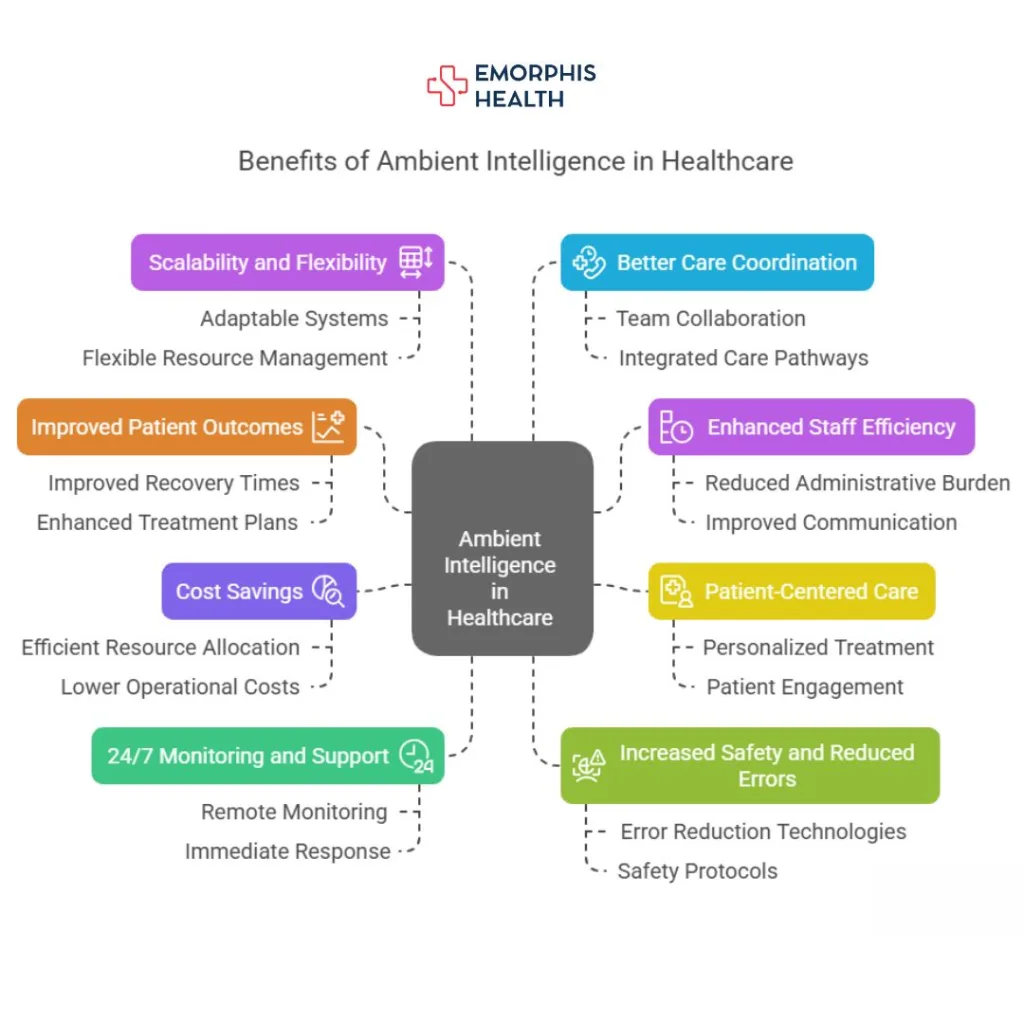
6. Increased Safety and Reduced Errors
Ambient intelligence improves clinical safety through AI-driven alerts, automated medication management, and hygiene tracking. This reduces human error and enhances infection control and decision-making.
7. Scalability and Flexibility
Designed to expand across various settings, from ICU to home care, these systems can be updated easily as patient needs change, helping providers stay agile in a dynamic healthcare landscape.
8. Better Care Coordination
By connecting devices, systems, and teams, ambient intelligence fosters seamless communication and unified care plans. Real-time insights enable coordinated, multidisciplinary treatment with fewer errors and improved outcomes.
These benefits make it clear that ambient intelligence in healthcare is more than just a technological upgrade it is a paradigm shift that supports smarter, safer, and more human-centered care.
Shaping Tomorrow’s Care, The Future of Ambient Intelligence in Healthcare
The future of ambient intelligence in healthcare promises to revolutionize the way care is delivered by creating smart, adaptive environments that respond in real time to patient needs. As this technology evolves, hospitals and homes will become intelligent spaces capable of adjusting lighting, and temperature, and monitoring vital signs to promote comfort and early detection of health issues.
In smart homes, ambient systems will support chronic disease management and elderly care by tracking daily behavior, detecting anomalies, and sending alerts to caregivers. This allows patients to receive continuous care while maintaining independence. AI-powered analytics will enable early interventions, helping reduce emergency visits and hospital readmissions.
At the same time, ambient intelligence will enhance mental health care by analyzing speech, behavior, and emotional cues to identify early signs of anxiety or depression. Hospitals will leverage this technology to automate workflows, manage resources efficiently, and reduce staff burden, resulting in safer and more responsive care environments.
Looking ahead, ambient intelligence will integrate with technologies like digital twins and augmented reality to offer predictive modeling and real time decision support for clinicians.

However, as adoption grows, strong data privacy and compliance measures will be essential. Regulatory frameworks like HIPAA and GDPR must evolve to ensure safe, ethical deployment.
Ultimately, ambient intelligence will become a core layer in modern healthcare delivering personalized, proactive, and efficient care that transforms patient outcomes and experience on a global scale.
As ambient intelligence in healthcare continues to evolve and expand, its integration into clinical environments must be backed by rigorous safety, privacy, and ethical standards. With the increasing reliance on patient data and AI-driven decision making, ensuring regulatory compliance is not just a legal obligation it’s a fundamental part of building trust and delivering safe, effective care. Healthcare providers, developers, and technology partners must work together to align innovations with global and regional healthcare regulations.
Compliance and Regulations
Developing ambient intelligence systems in healthcare requires strict adherence to multiple regulatory frameworks. In the United States, HIPAA ensures the confidentiality and security of patient data, especially as these systems continuously collect, process, and transmit sensitive health information. Any breach could lead to significant legal and reputational consequences.
FDA regulations must be followed for AI-powered clinical tools or devices that support diagnosis, monitoring, or treatment decisions. These systems must meet safety, efficacy, and performance standards, ensuring they are suitable for clinical use.
In the European Union, compliance with GDPR is essential when handling patient data. GDPR mandates clear consent, transparency, and secure data management practices critical for systems embedded within smart environments that monitor individuals 24/7.
Technical compliance is equally important. Standards such as IEC 60601 (electrical safety of medical devices) and ISO 13485 (quality management for medical devices) ensure that ambient systems are not only reliable but also safe for long-term use in clinical and residential care settings.
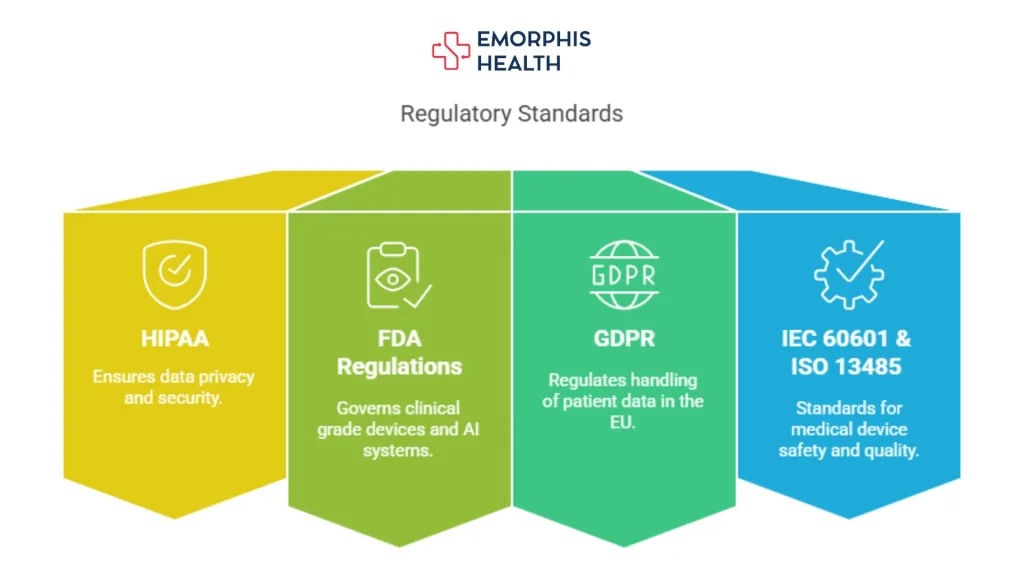
Hence the list is.
- HIPAA (Health Insurance Portability and Accountability Act) for data privacy and security.
- FDA Regulations for clinical grade devices and AI systems.
- GDPR for handling patient data in the EU.
- IEC 60601 & ISO 13485 for medical device safety and quality.
Adhering to these regulations not only protects patients but also streamlines market approval and adoption. It demonstrates credibility to healthcare institutions, payers, and stakeholders creating a strong foundation for innovation, growth, and long-term impact in the healthcare ecosystem.
Cost and Development Timeline
Creating an ambient intelligence system in healthcare involves costs that vary depending on complexity, features, and compliance requirements:
i. MVP Development: $100,000 $250,000
This includes foundational features like basic patient monitoring, environmental control (lighting, temperature), and initial data analytics. The cost also covers UI/UX design, limited device integration, and early-stage compliance measures such as HIPAA or GDPR readiness.
ii. Full-Scale Deployment: $500,000+
A full-scale solution integrates advanced AI analytics, voice command systems, real time decision support, full EHR integration, and support for multiple user types (clinicians, patients, administrators). It also involves rigorous testing, FDA clearance (if applicable), and adherence to medical device standards like IEC 60601 and ISO 13485.
iii. Timeline: 6 18 months, depending on the scope
Shorter timelines apply to MVPs with limited features, while full-scale systems require extended periods for development, prototyping, compliance audits, and deployment across care settings. Testing in live healthcare environments and integration with hospital systems can also impact timelines.
iv. Long-term ROI
It is substantial, especially in reduced readmissions, improved care, and optimized resource usage. By automating routine monitoring, enabling early interventions, and supporting better clinical decision-making, ambient intelligence solutions reduce strain on healthcare resources. Over time, these systems drive cost efficiency, enhance staff productivity, and improve patient satisfaction making them a high-value investment for future-ready healthcare organizations.
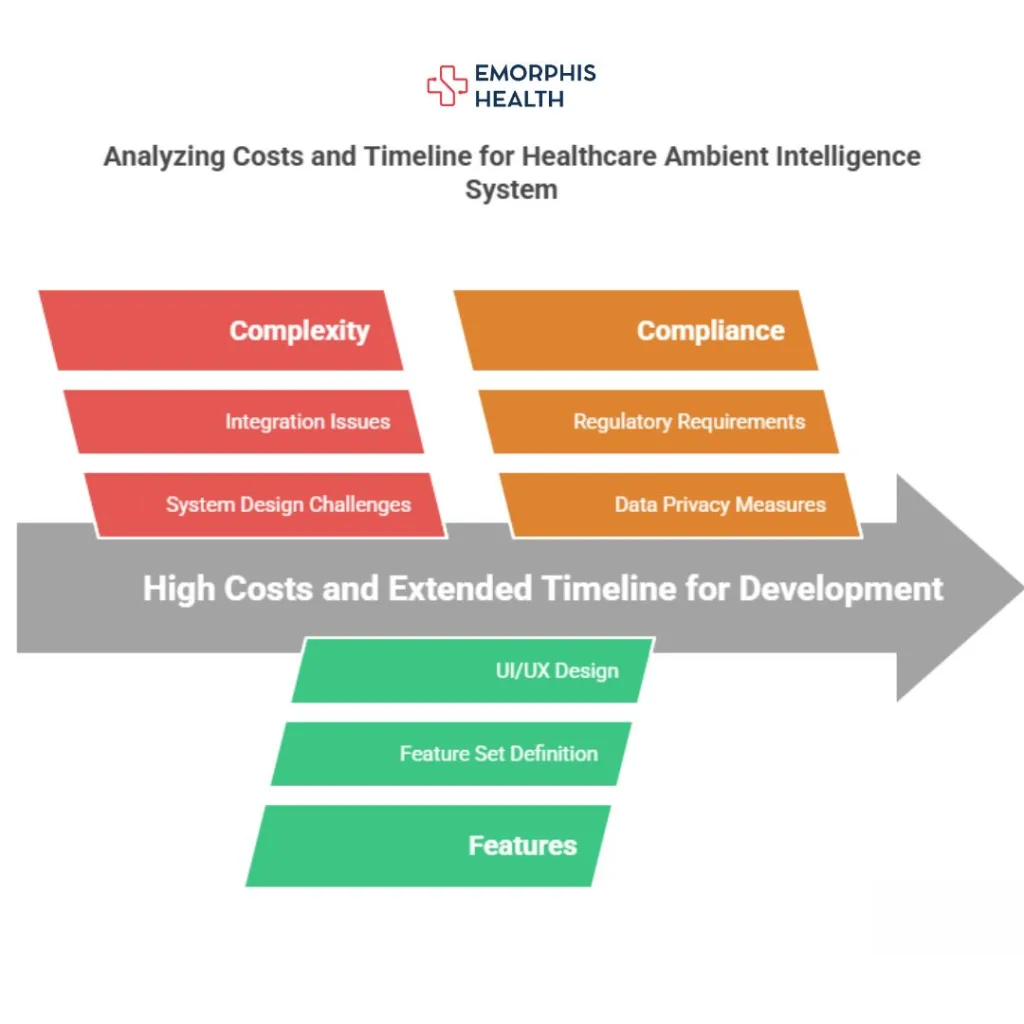
Why Choose Emorphis Health for Ambient Intelligence in Healthcare?
When it comes to building cutting-edge, compliant, and scalable ambient intelligence systems in healthcare, Emorphis Health is a trusted innovation partner. With expertise in healthcare IT, AI integration, IoT systems, and compliance-driven development, Emorphis delivers smart, future-ready solutions tailored to your needs.
Whether you’re building a smart ward, virtual assistant, or a comprehensive Ambient AI platform, Emorphis Health ensures seamless execution from concept to deployment.
Conclusion
Ambient intelligence in healthcare is more than a buzzword it’s a transformative force that is redefining how care is delivered, experienced, and managed. By 2032, the global ambient intelligence market is expected to reach $172.32 billion, growing at a CAGR of 24.8%, reflecting the rapid adoption of intelligent, responsive systems across industries especially in healthcare.
Integrating Ambient AI with real time data and context-aware environments enables smarter, safer, and more personalized care. Studies show that hospitals leveraging such technologies see up to 30% improvement in workflow efficiency and 25% fewer readmissions, thanks to predictive insights and automation.
Whether it’s elderly care, post-operative monitoring, or chronic disease management, ambient intelligence plays a pivotal role in advancing clinical outcomes and operational performance. However, successful implementation requires not just cutting-edge technology, but also strict regulatory compliance, strategic development planning, and expert execution.
From concept to full-scale deployment, choosing a forward-thinking tech partner like Emorphis Health ensures your vision is realized with precision and future-proofing. Backed by deep healthcare expertise and an innovation-driven culture, Emorphis Health empowers you to turn ambient intelligence into real-world impact.
Connect with our experts today to begin shaping the future of care smart, secure, and centered around the patient.

